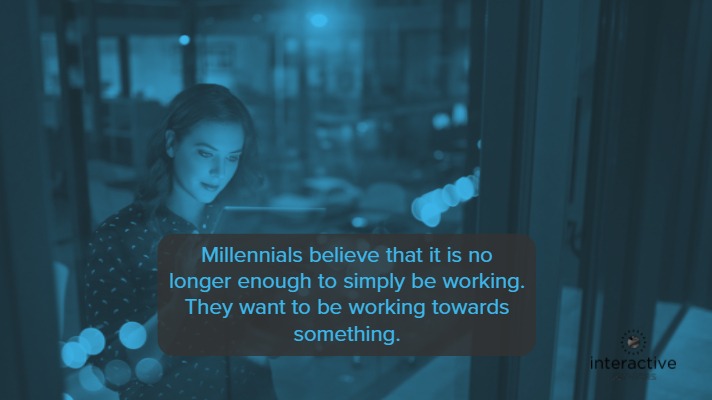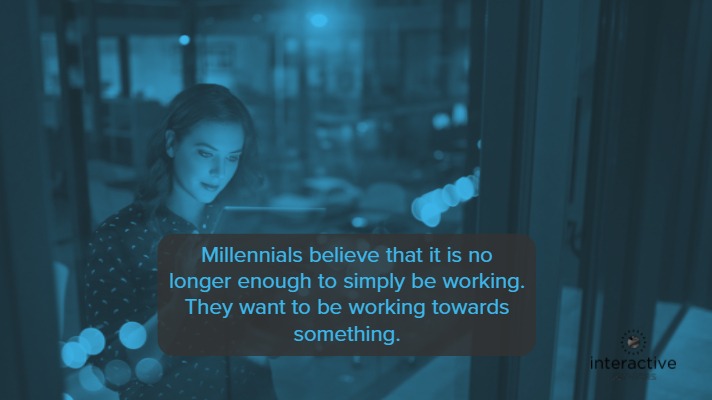 Imagine a workplace where compliance is embedded in the organization’s culture. A workplace where employees connect and collaborate to promote a culture of ethics across the organization. A workplace where feedback on regulatory issues informs everyday work habits without incurring additional training and professional development costs.
Imagine a workplace where compliance is embedded in the organization’s culture. A workplace where employees connect and collaborate to promote a culture of ethics across the organization. A workplace where feedback on regulatory issues informs everyday work habits without incurring additional training and professional development costs.
Imagine no further – enter the Millennial workforce. Take a look around and you might be surprised by what you see.
In 2013, Time Magazine’s cover declared Millennials the “Me Me Me Generation.” Although Time Magazine was suggesting that Millennials were going to “save us all,” the cover fueled extensive debate and controversy around Millennials’ work habits.
Look past that debate and controversy and you see a shift happening in our workplaces due to the influence of those supposedly “self-centered” Millennials.
Knowing Right from Wrong
Embedding a code of ethics into workplace behaviors is in full alignment with the Millennial mindset. More so than any other generation, Millennials want more than simply to hold a job; they want their work to reflect a greater social purpose.
We now have access to a generation who will go to great lengths to be heard and to have their opinions count. In “Maximizing Millennials in the Workplace,” Jessica Brack and Kip Kelly note that Millennials “are aware of their own vast numbers and their impact on the environment. This generation is socially conscious and expects their employers to act in socially conscious ways.”
This means weaving ethics and compliance into the workplace can no longer be an afterthought. We have a workforce at our fingertips that wants to know right from wrong from the get-go and wants to work for organizations that integrate those values and ethics into their core business strategies. We can shape the future of compliance training by leveraging this drive for social responsibility.
Connecting and Collaborating
Simon Sinek’s influential video on Millennials in the workplace (an episode of Inside Quest) casts a generality about the Millennial generation being coddled. His narrative is that many of them never had to find their own way, as they were driven to soccer practice, ballet lessons, after-school activities, and maybe even shuttled off to space camp.
What Sinek fails to highlight is that participation in those team sports and group activities is what encourages the Millennial generation to forge new, collaborative pathways as they join the workforce in large numbers.
Millennials find communication and collaboration a natural way of working. They have been raised participating in team-based projects and are acutely aware of their individual impact on the larger whole. They value communication, openness, and feedback. Are we ready for that feedback?
In this modern work environment, where communication happens at hyper-speed, why would we disconnect from this increased capacity to collaborate? It has been shown time and time again that groups and teams incorporating diverse perspectives and working styles generate innovation on a larger scale, and we have a full generation of individuals eager to join the workforce who embrace opportunities to collaborate and place values and purpose at the front of their work.
Sharing Stories for a Cause
This Millennial conviction is a personal one – they are invested in how the surrounding world impacts them as individuals, as well as their communities. We can save a significant amount of time and money by pausing and listening to their instincts and voices.
Provide avenues where your Millennials can share their perspectives on ethics and compliance issues in their everyday work and life situations. When given the opportunity, our Millennial workforce will tell us what they need to make an informed, positive impact on our organizations’ cultures.
Accessing Knowledge
Millennials are used to accessing new knowledge and information via different channels and via multiple devices, at anytime or anyplace. This means formal, one-off training is not enough. Instead, we need to create immediate opportunities for knowledge exchange, conversation, and feedback on ethics and compliance topics in a consistent and timely cadence. And, we need to frame these opportunities into a cause because we have access to an entire generation that wants to stand for that cause in one way, shape, or another.
This means you will better engage your Millennials in deeper understanding when their personal ethical convictions are taken seriously within the organization and your compliance efforts reflect their mindset. Ethics and compliance can no longer be treated as a set of rules within the organization – they need to be embedded into the very fabric of the workplace.
In How, Dov Seidman writes that it is values-based thinking, as opposed to rules and restrictions, that creates work environments of trust, risk, and innovation. He writes, “Values do double duty; they inspire us to do more than while simultaneously preventing us from doing less than.” In essence, the more we align ourselves with the core values of an organization, the more likely we are to uphold those values – this is especially true of Millennial members of the workforce who have deemed their organizations’ values to be fundamental to their reason for working in the first place.
Saving the Workplace
It is no longer about training a workforce to understand ethics and compliance. The Millennial workforce will personally champion their own moral compass within an organization. They are hungry for a “framework of good” that can guide their everyday practice, even when no one is watching over their shoulders.
So, how do we serve up compliance training to Millennials?
Perhaps it’s not so much about delivering a code of ethics program to our Millennial employees. Rather, our transfer of compliance knowledge should embrace the need for purpose, provide the Millennial workforce that knowledge when and where they need it, and embed their passion for social good into every corner of our workplace.
